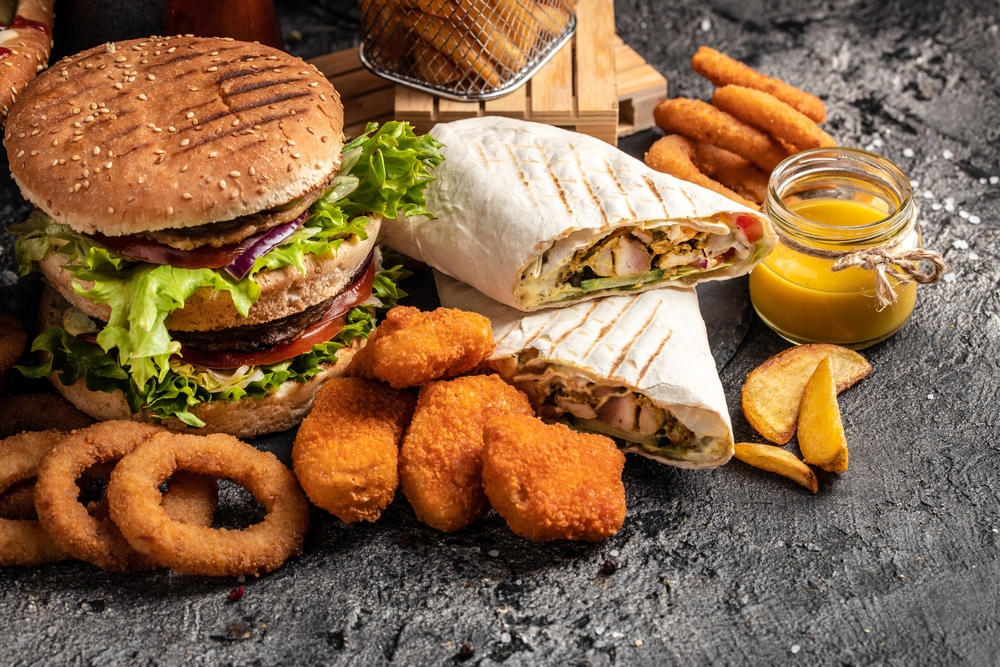Did you know that some foods you eat daily give you brain fog?
A few years ago, I wasn’t exactly putting my health first. I wasn’t sleeping well, and my eating habits were all over the place. My breakfasts were packed with sugary treats, and chips were my go-to snack. Because of these unhealthy choices, I constantly felt irritated, forgetful, and sluggish—like my brain was in a fog. My productivity tanked, and I struggled to keep up with work.
In short, I was living with daily brain fog, and let me tell you—it was awful. It wasn’t until I started paying attention to how I was treating my body that I noticed a difference. I started prioritizing 8 hours of sleep per night, replaced chips with nuts and fresh fruit, said goodbye to soda and welcomed water into my life, and swapped out sugary breakfasts for protein-packed options.
Don’t get me wrong; I still enjoy eating unhealthy things every once in a while, but thanks to these small changes, my mind felt sharper than ever.
If you experience brain fog just like me, you should know that certain foods can wreak havoc on your brain, leaving you feeling sluggish, forgetful, and unmotivated. The good news? You can easily regain your clarity back. All you have to do is be mindful of your eating and self-care habits, and you’ll feel incredible in no time.
With that being said, if you feel like you’re in a constant brain fog, these are the foods that may be causing it:

1. Hot dogs
I know, I know, hot dogs taste really good, but eating too much of them or too often can lead to brain fog. Unfortunately, this delicious food is filled with nitrate, sodium, and other preservatives that can cause inflammation in your body.
Moreover, hot dog meat is typically low in nutrients but packed with high levels of unhealthy fats. Eating this meal regularly will also make you bloated, cranky, fatigued, and maybe even a few pounds heavier.
2. Ultra-processed foods
Ultra-processed foods are those tasty items that go through loads and loads of processing stages and are packed with a plethora of added ingredients. While they may be flavorful, they’re rich in unhealthy fats, sugars, and sodium and usually contain lots of coloring, preservatives, and flavorings.
According to nutritionists, indulging in too many ultra-processed foods is one of the main causes why people experience brain fog. Sadly, this includes most of our favorite treats, like donuts, muffins, packaged breads, and breakfast cereals.
Even though there’s not enough research to conclude, experts found a connection between cognitive decline and consuming too many ultra-processed foods. If you can’t say goodbye to your favorite indulgences, consume them less often or make them at home with more natural and higher-quality ingredients.
3. Alcohol
Even though alcohol is not a food, I had to include it on this list because it can cause severe brain fog. According to research, this affects both hydration and your central nervous system. Not only will you not feel your best after drinking, but your body may also need a couple of extra days to return to its normal state.
If you don’t want to feel terrible the next day, you’d better eat something healthy a few hours before drinking and make sure you keep a water bottle nearby. You can reduce the effects of brain fog with plenty of water, so you feel better and brand new faster.
You can speed up recovery and avoid feeling down or groggy by fueling your body with electrolytes—especially after physical effort or drinking alcohol. Electrolytes help replenish your system and do wonders for brain fog!

4. Fried food
Just like sugary treats, fried food is also a perfect recipe for brain fog. Low in nutrients and high in salt and unhealthy fats, French fries, crispy chicken, chips, fried fish, churros, or corn dogs may be good for the soul and your taste buds but terrible for your body and brain fog.
According to nutritionists, regular consumption of fried food can also trigger inflammation in your body, increasing your risk of heart disease, obesity, and high blood pressure.
5. Refined carbs
Refined carbs, also known as processed carbs, are grain products that have undergone extensive modification from their original state. The bran and germ, which are the most nutrient-dense portions of the grain, are frequently removed during this process, leaving only the starchy endosperm. The perfect examples of refined carbs are white bread and white rice. They taste good, but they may upset your stomach and cause brain fog.
Researchers discovered that, unlike whole grain foods, the starchy endosperm can raise and lower blood sugar levels quickly. As a response, your body releases chemicals that cause the symptoms of brain fog, which include trouble focusing, forgetfulness, and confusion.
6. Food additives
Food additives are chemical substances added to foods to enhance flavor and color and extend the life shelf. Nutritionists say that many people experience brain fog after consuming foods with additives like aspartame and monosodium glutamate (MSG).
Of course, the connection between brain fog and food additives is mostly based on personal experiences, but if you notice you’re feeling foggy after eating certain additives, you’d better avoid them. Pay attention to how your body reacts to certain things, especially food—it’s a simple way to take control of your clarity and well-being!

7. Candy
As much as I love candy, I know it’s not the best thing for my body or brain. This is a perfect example of an ultra-processed food that looks and tastes incredible but is actually terrible for your well-being.
Candy, chocolate, jelly, and other sugary treats are loaded with sugar, causing sudden spikes in blood sugar levels. These spikes are often followed by sharp drops, leaving you feeling distracted, low on energy, and mentally foggy.
8. Soda
Okay, I know soda isn’t food, but how many of us pair a fizzy drink with our meals? It may taste incredible and trigger your brain into thinking that your lunch or dinner is a treat, but your body won’t be happy.
Soda is packed with sugar and artificial ingredients, which can lead to a quick spike and crash in your blood sugar levels. Therefore, you’ll feel sluggish, bloated, unmotivated, and overall terrible while craving more of it.
To avoid brain fog, try cutting back on soda and opting for healthier beverages like herbal tea, 100% fruit juice, or good old water. Make plain water more exciting by adding lemon slices, mint leaves, or fruits—turning it into a delicious, refreshing, and detoxifying drink you’ll love!
Takeaway
Brain fog is a dreadful obstacle that slows you down and interferes with your ability to focus and feel good. Even though it may seem like an inevitable aspect of life, small changes in your habits and diet can have a significant impact. For example, you can restore mental clarity and vitality by recognizing and cutting back on foods that don’t do you any good.
Keep in mind that balance and healthy eating are essential for brain and body function. Make sure you treat yourself well by eating delicious and nutritious foods and drinking lots of water. Have a balanced lifestyle, eat everything you want in moderation, and watch that brain fog go away!
Have you ever experienced any negative side effects from consuming the foods mentioned above? Do you know any other foods that cause brain fog? Leave a comment below and join the conversation!
If you find this article helpful and would like to check out something else from Nutrition in USA, here’s a good post for you: 9 Mashed Potato Recipes You’ve Never Heard of but MUST Try!







